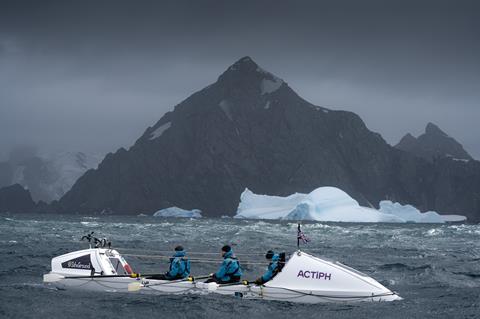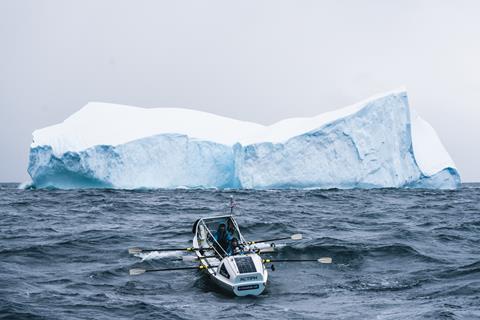
Actiph water founder Jamie Douglas-Hamilton might now have 15 world records to his name, but even he admits his latest expedition was “gruelling”.
In January he was among a team of six to attempt to retrace a leg of route taken by Antarctic explorer Ernest Shackleton, and row between Northern Antarctica’s King George Island to South Orkney Islands, known as some of the world’s roughest seas.
Despite having to reroute the row after some of the crew suffered frost bite, the expedition still set eight world records – covering 407 miles in six days. More remarkable still is that it occurred just five months after Douglas-Hamilton, 41, underwent open-heart surgery to treat a leaking aortic valve.
“If it had happened last year before I knew I had the hereditary condition I would have 100% died,” Douglas-Hamilton says. After three months recovery, during which he felt like he’d “been hit by a bus”, he was left with two months to train for the row.
Post-op recovery aside, Douglas-Hamilton said the windchill combined with 100% humidity was the hardest part of the expedition.
The ‘Shackleton Mission’ was originally set for December 2022, but had to be postponed when Douglas-Hamilton was diagnosed with the condition and rushed into surgery.
It was in tribute to Harry McNish, Shackleton’s carpenter who was overlooked for a Polar Medal despite playing crucial role in helping to save the crew. Douglas-Hamilton is campaigning for the medal to be awarded posthumously.

The eight records set include first row from Antarctica, the first row on Scotia sea and the first to row the Southern Ocean from south to north.
Douglas-Hamilton, the grandson of explorer Douglas Douglas-Hamilton, is no stranger to Antarctic expeditions, having achieved seven world records previously.
In 2017, he was part of a team that became he first to ever row the perilous ‘Drake Passage’, a 650-nautical mile strait between the southern tip of South America and the West Antarctic Peninsula.
Prior to that he completed a 5,000-mile row between Australia and Africa in 2014. It was during this expedition he first got the idea for the Actiph brand, after discovering he felt more rehydrated after mixing a little salt water with his standard drinking water.
The crew were unable to take Actiph water on the latest row, due to weight specifications, but the company sponsored the expedition.
Records aside, Douglas-Hamilton hopes his experience can raise awareness about heart conditions, while encouraging people to be active.
More than 160,000 people die from a heart and circulatory diseases in the UK each year, according to the British Heart Foundation. Many symptoms go unnoticed,
”I was shocked when they told me,” Douglas-Hamilton says, adding that though he had symptoms, including fatigue after exercise, for three years before his diagnosis he never thought they were to do with a heart condition.
For now at least he’s not planning any more expeditions.
“I always said this was the last one, but then again I said that about the last one,” Douglas-Hamilton says.
For now, his focus is growing global sales of Actiph’s ionised alkaline water and energy drink range Acti+. The company, which launched in 2017, is stocked in Sainsbury’s, Tesco, Holland & Barrett and Whole Foods Market, among others, and also exports to 20 markets globally, including a heavy presence in the Middle East.
“It’s very hard to actually to try to do both things – run a business and the training,” Douglas-Hamilton says. “But I think it’s very important to have something else to focus on while you’re training.”



















No comments yet